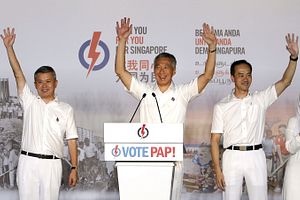On September 11, Singapore held its general election (GE15). Voters went to the polls under grim skies, with the Pollutant Standards Index (PSI) at an unhealthy 150 to 160, courtesy of the haze originating from Indonesian forest fires. But while the sky may have been cloudy, the verdict Singaporeans delivered was crystal clear. The ruling People’s Action Party (PAP), in power since the country’s independence in 1965, received an overwhelming mandate for another five years. It won 83 out of 89 seats and increased its share of valid votes cast from 60.14 percent in 2011 to 69.86 percent, an increase of nearly 10 percent.
We have advised 21 governments across the world. We have never seen one that has consistently managed to retain the trust of a significant majority of the people for half a century. The fact that the same party would actually increase its share of the popular vote to nearly 70 percent, after 50 years in power, is unprecedented.
Before the election, political pundits and academics everywhere, both within Singapore and outside, were near unanimous that the PAP would have a rough time of it at this election. The consensus was that it would lose a few more seats and its popular vote percentage would slip further, continuing the trends of the previous two elections.
In 2001, PAP received 75.3 percent of the popular vote. This declined to 66.6 percent in 2006m and then to 60.1 percent in 2011. During the 2011 presidential election, the PAP candidate won by less than 0.5 percent of the votes cast. The party also lost the Hougang by-election in 2012 and Punggol East by-election in 2013. The conventional wisdom was that this downward slide in the fortunes of the PAP would continue indefinitely, the new normal for Singapore politics.

































